| Listing 1 - 8 of 8 |
Sort by
|
Book
ISBN: 1771101202 1459333772 Year: 1975 Publisher: Toronto : Pontifical Institute of Mediaeval Studies,
Abstract | Keywords | Export | Availability | Bookmark
 Loading...
Loading...Choose an application
- Reference Manager
- EndNote
- RefWorks (Direct export to RefWorks)
Insolubilia (Logic) --- Manuscripts, Medieval --- Manuscripts
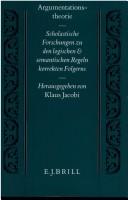
ISBN: 9789004450448 9789004098220 Year: 1993 Publisher: Leiden;Boston BRILL
Abstract | Keywords | Export | Availability | Bookmark
 Loading...
Loading...Choose an application
- Reference Manager
- EndNote
- RefWorks (Direct export to RefWorks)
Dialectic as the doctrine/art of disputing for and against a given thesis held a central position at the medieval schools and universities. The intensive examination of medieval manuscript sources in recent years has revealed the fertility and subtlety of scholastic thinking and its relevance to the modern study of logic and the philosophy of language. The contributions to this volume focus on a series of questions which were central to scholastic logic, the questions concerning the validity of argumentation and proof. The 35 papers - written partly in English and partly in German - range from examinations of basic questions of syntax and semantics and of the theory of inference through presentations of the rules which define logical consistency, to treatments on the use of logic in the natural sciences, in practical discourse and in theology. Some of the texts being thoroughly analysed and interpreted are edited in this volume for the first time. The authors include most of the established experts in the field and their papers provide a survey of the current state of research in both its historical and systematic aspects. The parallel English and German introductions by the editor link the individual papers to give an introduction to the scholastic theory of argumentation, which should also be comprehensible to non-specialists.
Insolubilia (Logic) --- Logic, Medieval --- Topic (Philosophy)
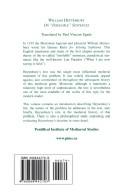
ISBN: 088844270X 9780888442703 Year: 1979 Volume: 21 Publisher: Toronto: Pontifical institute of mediaeval studies,
Abstract | Keywords | Export | Availability | Bookmark
 Loading...
Loading...Choose an application
- Reference Manager
- EndNote
- RefWorks (Direct export to RefWorks)
Insolubilia (Logic) --- Logic, Medieval --- Medieval logic --- Insolubles (Logic) --- Liar paradox --- Logic, Medieval. --- Insolubilia (Logic).
Book
ISBN: 9782503589336 9782503589404 2503589332 Year: 2022 Publisher: Turnhout: Brepols,
Abstract | Keywords | Export | Availability | Bookmark
 Loading...
Loading...Choose an application
- Reference Manager
- EndNote
- RefWorks (Direct export to RefWorks)
Pierre d’Aillys Insolubilia, verfasst um 1372 an der Universität von Paris, sind ein wichtiges Zeugnis in der Geschichte der Logik und Philosophie des späten Mittelalters. Sie erfreuten sich bereits eine Generation nach ihrer Entstehung aufgrund ihres klaren Stils großer Beliebtheit bei zeitgenössischen Autoren und stießen noch über das 15. Jahrhundert hinaus auf reges Interesse. Ihr Thema – semantische Antinomien wie die berühmte Antinomie des Lügners – wurde seit dem späten 12. Jahrhundert für mehr als drei Jahrhunderte an den Artes-Fakultäten kontrovers diskutiert, eine reich überlieferte Insolubilia-Literatur entstand. Indem Antinomien wie der „Lügner“ mit dem aristotelischen Gesetz vom Widerspruch in Konflikt stehen, fordern sie die traditionelle Logik in einem ihrer wichtigsten Prinzipien heraus. Die sophismatische Disputation solcher Non-Standard-Materialien führte so zur Analyse der fundamentalen Begriffe des Satzes, der Wahrheit und der Bedeutung. Abhandlungen wie die Insolubilia Pierre d’Aillys geben damit einen Einblick in die zur Zeit des Autors vertretenen Positionen zum Verhältnis von Sprache, Geist und Wirklichkeit. Die vorliegende Edition ist die erste moderne, textkritische Edition der Insolubilia und basiert auf Grundlage aller Zeugen des Textes. Sie bietet dem heutigen Leser erstmals einen zuverlässigen und authentischen Text des Traktats.
Medieval Latin literature --- Petrus de Alliaco --- Insolubilia (Logic) --- Semantics (Philosophy) --- Antinomy --- Antinomie --- Sémantique (philosophie) --- Édition critique --- Ailly, Pierre d',
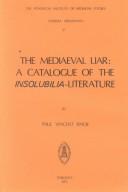
ISBN: 0888443544 9780888443540 Year: 1975 Volume: 5 Publisher: Toronto: Pontifical institute of mediaeval studies,
Abstract | Keywords | Export | Availability | Bookmark
 Loading...
Loading...Choose an application
- Reference Manager
- EndNote
- RefWorks (Direct export to RefWorks)
Logic --- History of philosophy --- anno 1200-1499 --- Insolubilia (Logic) --- Insolubles (Logique) --- Manuscripts, Medieval --- Manuscripts --- Catalogs --- 091:16 --- -Manuscripts, Medieval --- -Medieval manuscripts --- Insolubles (Logic) --- Liar paradox --- Logic, Medieval --- Handschriftenkunde. Handschriftencatalogi-:-Logica. Kennistheorie. Logische methodiek. Wetenschapsfilosofie --- -Catalogs --- Catalogs. --- -Handschriftenkunde. Handschriftencatalogi-:-Logica. Kennistheorie. Logische methodiek. Wetenschapsfilosofie --- 091:16 Handschriftenkunde. Handschriftencatalogi-:-Logica. Kennistheorie. Logische methodiek. Wetenschapsfilosofie --- Manuscripts&delete& --- Insolubilia (Logic) - Manuscripts - Catalogs --- Manuscripts, Medieval - Catalogs
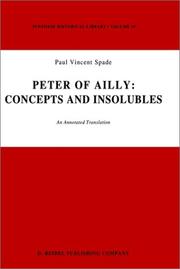
ISBN: 9027710791 9400989954 9400989938 9789027710796 Year: 1980 Volume: 19 Publisher: Dordrecht: Reidel,
Abstract | Keywords | Export | Availability | Bookmark
 Loading...
Loading...Choose an application
- Reference Manager
- EndNote
- RefWorks (Direct export to RefWorks)
Concepts --- Insolubilia (Logic) --- Semantics (Philosophy) --- Logic --- -Language and languages --- Early works to 1800 --- Philosophy --- Language and languages --- -Logic --- -Semantics (Philosophy) --- Concept formation --- Abstraction --- Knowledge, Theory of --- Perception --- Psychology --- Intension (Philosophy) --- Logical semantics --- Semantics (Logic) --- Semeiotics --- Significs --- Syntactics --- Unified science --- Logic, Symbolic and mathematical --- Logical positivism --- Meaning (Psychology) --- Philosophy, Modern --- Semiotics --- Signs and symbols --- Symbolism --- Analysis (Philosophy) --- Definition (Philosophy) --- Argumentation --- Deduction (Logic) --- Deductive logic --- Dialectic (Logic) --- Logic, Deductive --- Intellect --- Science --- Reasoning --- Thought and thinking --- Foreign languages --- Languages --- Anthropology --- Communication --- Ethnology --- Information theory --- Philology --- Linguistics --- Insolubles (Logic) --- Liar paradox --- Logic, Medieval --- Methodology --- Concepts. --- Early works to 1800. --- Philosophy. --- Insolubilia (Logic). --- Semantics (Philosophy). --- Logic - Early works to 1800 --- Language and languages - Philosophy
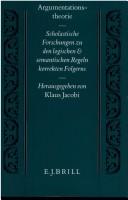
ISBN: 9004098224 9004450440 Year: 1993 Volume: 38 Publisher: Leiden ; New York ; Köln E.J. Brill
Abstract | Keywords | Export | Availability | Bookmark
 Loading...
Loading...Choose an application
- Reference Manager
- EndNote
- RefWorks (Direct export to RefWorks)
Conclusie --- Conclusion --- Gemeenplaatsen --- Gevolgtrekking --- Inference --- Inference (Logic) --- Insolubilia (Logic) --- Insolubilia (Logica) --- Insolubles (Logic) --- Insolubles (Logique) --- Lieux communs --- Loci communes --- Logic [Medieval ] --- Logica [Middeleeuwse ] --- Logique médiévale --- Medieval logic --- Middeleeuwse logica --- Topic (Philosophy) --- Topica (Filosofie) --- Topiek (Filosofie) --- Topiek [Wijsgerige ] --- Topique (Philosophie) --- Topoi --- Wijsgerige topiek --- Logic, Medieval --- Inférence (Logique) --- 162 --- Philosophy --- Liar paradox --- Ampliative induction --- Induction, Ampliative --- Reasoning --- Besluitvorming. Retoriek. Filosofische argumentatie. Redeneerprocessen --- 162 Besluitvorming. Retoriek. Filosofische argumentatie. Redeneerprocessen --- Inférence (Logique) --- Logique médiévale
Book
ISBN: 9789042923171 9042923172 Year: 2010 Volume: 10 Publisher: Paris: Peeters,
Abstract | Keywords | Export | Availability | Bookmark
 Loading...
Loading...Choose an application
- Reference Manager
- EndNote
- RefWorks (Direct export to RefWorks)
"The fourteenth-century thinker Thomas Bradwardine is well known in both the history of science and the history of theology. The first of the Merton Calculators (mathematical physicists) and passionate defender of the Augustinian doctrine of salvation through grace alone, he was briefly archbishop of Canterbury before succumbing to the Black Death in 1349. This new edition of his Insolubilia, made from all thirteen known manuscripts, shows that he was also a logician of the first rank. The edition is accompanied by a full English translation. In the treatise, Bradwardine considers and rejects the theories of his contemporaries about the logical puzzles known as 'insolubles,' and sets out his own solution at length and in detail. In a substantial introduction, Stephen Read describes Bradwardine's analysis, compares it with other more recent theories, and places it in its historical context. The text is accompanied by three appendices, the first of which is an extra chapter found in two manuscripts (and partly in a third) that appears to contain further thoughts by Bradwardine himself. The second contains an extract from Ralph Strode's Insolubilia, composed in the 1360s, repeating and enlarging on Bradwardine's text; and the third consists of an anonymous text that applies Bradwardine's solution to a succession of different insolubles"--P. [4] of cover.
Antinomy (Logic) --- Argument du menteur --- Avocat [Paradoxe de l' ] --- Barbier [Paradoxe du ] --- Begrippen --- Concepten --- Concepts --- Epimenidean paradox --- Imprédicable de Grelling [Paradoxe de l' ] --- Leugenaar [Paradox van de ] --- Liar antinomy --- Liar paradox --- Menteur [Paradoxe du ] --- Paradox of Epimenides --- Paradox of Russel --- Paradox of the Liar --- Paradox van de leugenaar --- Paradoxe d'Épiménide --- Paradoxe de Russell --- Paradoxe de Sancho Pança --- Paradoxe de l'avocat --- Paradoxe de l'imprédicable de Grelling --- Paradoxe de violation de lois internes --- Paradoxe des relations --- Paradoxe du barbier --- Paradoxe du menteur --- Relations [Paradoxe des ] --- Russel's paradox --- Russell [Paradoxe de ] --- Sancho Pança [Paradoxe de ] --- Semantics (Philosophy) --- Semantiek (Filosofie) --- Sémantique (Philosophie) --- Violation de lois internes [Paradoxe de ] --- Épiménide [Paradoxe d' ] --- Insolubilia (Logic) --- Manuscripts, Medieval --- Logic --- Language and languages --- Manuscripts --- Catalogs --- Philosophy --- Intension (Philosophy) --- Logical semantics --- Semantics (Logic) --- Semeiotics --- Significs --- Syntactics --- Unified science --- Logic, Symbolic and mathematical --- Logical positivism --- Meaning (Psychology) --- Philosophy, Modern --- Semiotics --- Signs and symbols --- Symbolism --- Analysis (Philosophy) --- Definition (Philosophy) --- Insolubles (Logic) --- Logic, Medieval --- Concept formation --- Abstraction --- Knowledge, Theory of --- Perception --- Psychology --- Manuscripts&delete& --- Early works to 1800 --- Manuscripts [Medieval ] --- Insolubilia (Logic) - Manuscripts - Catalogs --- Manuscripts, Medieval - Catalogs --- Logic - Early works to 1800 --- Language and languages - Philosophy
| Listing 1 - 8 of 8 |
Sort by
|

 Search
Search Feedback
Feedback About UniCat
About UniCat  Help
Help News
News